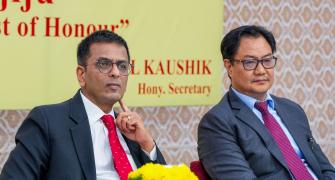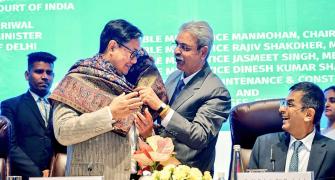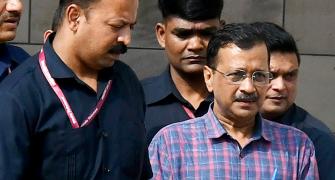Judges must retire so the succeeding generations point out errors of the past and rejig legal principles for society to evolve, Chief Justice DY Chandrachud said on Saturday.

Sharing his perspective on the retirement age of judges at the Hindustan Times Leadership Summit in New Delhi, Chandrachud said while the American constitution has no age of retirement for judges, in India, judges retire after a particular age.
The CJI said it would be "too much of a responsibility" cast on human beings in terms of their own infallibility by postulating that they should not retire from office.
"We have followed a model where judges retire. But as someone who has been in the system for 23 years as a judge, I have a different take. In a sense, it is important that judges must retire because its too much of a responsibility to cast on a human being in terms of their own infallibility by postulating that they should not retire from their office.
"Judges are human beings prone to errors and societies evolve. You must pass on the mantle to succeeding generations who would be able to point out errors of the past and rejig legal principles for society to evolve. Because to give that sort of power to unelected judges to continue for life, in the Indian context, it is wisely not adopted by the Indian Constitution. So as to allow for a source of change for the transformation of legal principles," he said.
Currently, the retirement age for judges in India is 60 years in lower courts, 62 in high courts and 65 in the Supreme Court.
A parliamentary committee had recommended a performance appraisal system for extending the tenure of judges of the Supreme Court and high courts beyond the existing retirement age.
During the tenure of the UPA-II government, a bill was introduced in the Lok Sabha to bring the retirement age of HC judges on par with those of the apex court but it never came up for consideration and lapsed.
Asserting that the judgment of a court cannot be "directly overruled", Chandrachud said the legislature can exercise the option of enacting a fresh law to "cure" deficiency in a judicial order.
He said judges don't think about how society will respond when they decide cases, unlike the different arms of the government.
"There is a dividing line between what the legislature can do and what the legislature can't do when there is a judgment of the court. If a judgment decides a particular issue and it points out a deficiency in law, it is always open for the legislature to enact a fresh law to cure the deficiency," the CJI said.
"What the legislature cannot do is to say that we think the judgment is wrong and therefore we overrule the judgment. The judgment of a court cannot be directly overruled by the legislature," he asserted.
The CJI asserted judges are guided by constitutional morality and not public morality while adjudicating cases.
“The fact that judges are not elected is not our deficiency but our strength,” he observed.
Chandrachud said the Supreme Court of India is the people's court which is meant to understand the grievances of people and what it does is very different from what the Supreme Court of the United States does.
The American Supreme Court decides 80 cases in a year, he said, adding, "We have disposed of at least 72,000 cases this year and there are still two months to go. That gives the difference in the work which we do. It is important for us as a court to continue to have faith of citizens in terms of work which we do."
Contending that there are "structural barriers" at entry-level in the Indian judicial system, Chandrachud said more women will join judiciary if it offers a level playing field.
"We need to redefine merit in an inclusive sense. Yes, it's correct that we do not have adequate women in the higher judiciary because there are structural barriers in the entry level of the judicial system. Most of the tests are conducted in English and are urban-centric.
"For example, entry into the chamber of senior counsel does not follow merit and it's an old boys club. If you open a level playing field for women, they are capable of gaining entry, you will have more women in the judiciary," he said.
Chandrachud said one of the critical barriers to understanding the court process or accessing justice is language.
"The Supreme Court of India conducts all its proceedings in English and the Constitution did so (provide for it) for a valid reason which was that in a country which has 22 languages recognised by the Constitution, you have diverse judges coming from different parts of the country, English was construed as a central language which will bind the institution together.
"But that is not the language we speak, which means we are not able to reach out to the people in languages they understand. So, one of the key things we have been doing for the past year is translating all the judgements of the apex court. There we are using machine learning and AI-assisted tools to translate them, and today we have 31,000 judgements translated in different languages. The idea is that courts must reach out to people," he said.
When asked whether 65 is too young an age for Supreme Court judges to retire, the CJI said it is for Parliament to decide.
"It is important that judges must retire. It is too much of a responsibility for human beings. Judges are human beings...you must pass on the mantle to succeeding generations who would be able to point out errors of the past and rejig legal principles for society to evolve.
"....Because to give that sort of power to unelected judges to continue for life, in the Indian context, it is wisely not adopted by the Indian Constitution," he said.
About the challenges faced by the judges of the Supreme Court, Chandrachud said the apex court decides around 200 cases every week.
"The real challenge of a judge is to balance competing requirements....Huge inflow of work and the need to create mental space to decide seminal issues, that's the challenge before a contemporary judge," he said, adding that the real work of a judge starts after court rises at 4 in the evening.
He referred to the success of the Indian team at the cricket World Cup, saying they inspire him.
"I saw the Indian cricket team lift the last World Cup in 2011... I wish them the best. I admire this team's commitment to physical and mental fitness and ability to maintain the state of equilibrium,” Chandrachud said.










